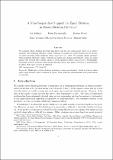| dc.contributor.author | Ashlagi, Itai | |
| dc.contributor.author | Karagözoğlu, Emin | |
| dc.contributor.author | Klaus, Bettina | |
| dc.date.accessioned | 2017-07-05T13:33:16Z | |
| dc.date.available | 2017-07-05T13:33:16Z | |
| dc.date.issued | 2012-02 | |
| dc.date.submitted | 2011-05 | |
| dc.identifier.issn | 0165-4896 | |
| dc.identifier.uri | http://hdl.handle.net/1721.1/110438 | |
| dc.description.abstract | We consider estate division problems and show that for any claim game based on a (estate division) rule satisfying efficiency, equal treatment of equals, and order preservation of awards, all (pure strategy) Nash equilibria induce equal division. Next, we consider (estate division) rules satisfying efficiency, equal treatment of equals, and claims monotonicity. Then, for claim games with at most three agents, again all Nash equilibria induce equal division. Surprisingly, this result does not extend to claim games with more than three agents. However, if nonbossiness is added, then equal division is restored.
Highlights
► We consider estate division problems, a generalization of bankruptcy problems, in which a positive-valued estate has to be divided among a set of agents. ► We show that for any claim game based on a (estate division) rule satisfying efficiency, equal treatment of equals, and order preservation of awards, all (pure strategy) Nash equilibria induce equal division. ► All our results point towards the same intuitive message: if it is impossible or difficult to test the legitimacy of claims, the conflict will escalate to the highest possible level and equal division is the “non-discriminating” outcome in Nash equilibrium. | en_US |
| dc.language.iso | en_US | |
| dc.publisher | Elsevier | en_US |
| dc.relation.isversionof | http://dx.doi.org/10.1016/j.mathsocsci.2012.01.004 | en_US |
| dc.rights | Creative Commons Attribution-NonCommercial-NoDerivs License | en_US |
| dc.rights.uri | http://creativecommons.org/licenses/by-nc-nd/4.0/ | en_US |
| dc.source | MIT web domain | en_US |
| dc.title | A non-cooperative support for equal division in estate division problems | en_US |
| dc.type | Article | en_US |
| dc.identifier.citation | Ashlagi, Itai; Karagözoğlu, Emin and Klaus, Bettina. "A non-cooperative support for equal division in estate division problems." Mathematical Social Sciences 63, 3 (May 2012): 228-233 © 2012 Elsevier | en_US |
| dc.contributor.department | Sloan School of Management | en_US |
| dc.contributor.mitauthor | Ashlagi, Itai | |
| dc.relation.journal | Mathematical Social Sciences | en_US |
| dc.eprint.version | Author's final manuscript | en_US |
| dc.type.uri | http://purl.org/eprint/type/JournalArticle | en_US |
| eprint.status | http://purl.org/eprint/status/PeerReviewed | en_US |
| dspace.orderedauthors | Ashlagi, Itai; Karagözoğlu, Emin; Klaus, Bettina | en_US |
| dspace.embargo.terms | N | en_US |
| dc.identifier.orcid | https://orcid.org/0000-0003-2124-738X | |
| mit.license | PUBLISHER_CC | en_US |
